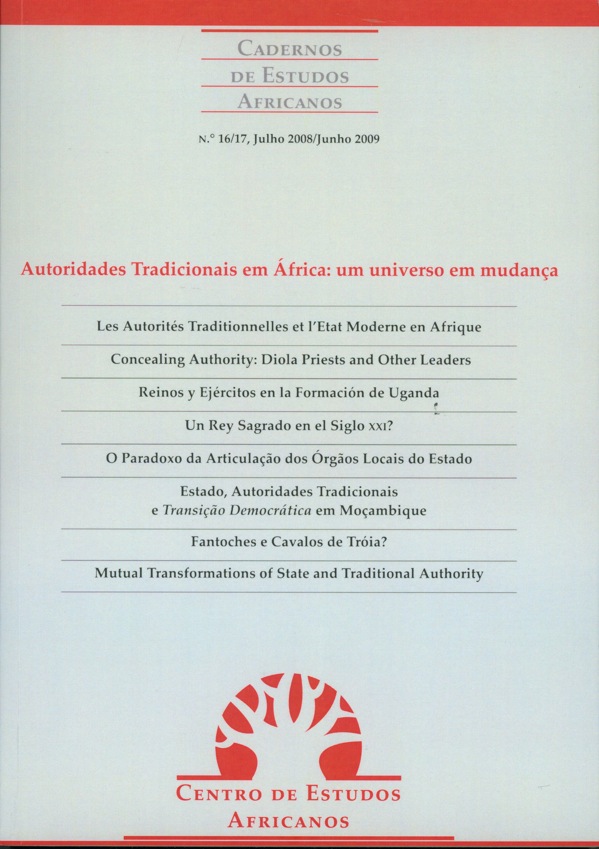Mutual Transformations of State and Traditional Authority. The renewed role of chiefs in policing and justice enforcement in Mozambique
DOI:
https://doi.org/10.4000/cea.192Palavras-chave:
traditional authority, State, Power, Dombe, MozambiqueResumo
This article explores the renewed role of chiefs in policing and justice enforcement from the perspective of every-day practices and modes of organising the relationship between chiefs and local state institutions. Based on ethnographic material from Dombe in Sussundenga District, in Mozambique, it asks what the newly forged relationship implies for local state and traditional authority. The article shows that the Decree 15/2000 was appropriated by the local tiers of state police not as a benign recognition of already existing chiefly practices, but as a means to regulate chiefs and bolster state authority in the former war-zone of Dombe.Referências
Alexander, J. (1997). “The local state in post-war Mozambique: Political practices and ideas about authority”, Africa, 67(1), 1-26.
DOI : 10.2307/1161268
Boletim da República (2000a), de 25 de Agosto. Regulamento. Diploma Ministerial n.º 107-a/2000, Ministério de Administração Estatal.
Boletim da República (2000b). Decreto n.º 15/2000, de 20 de Junho.
Buur, L.; Kyed, H. M. (2006). “Contested sources of authority: Re-claiming state sovereignty and formalizing traditional authority in post-conflict Mozambique”, Development and Change, 37 (4), 847-869.
Buur, L.; Kyed, H. M. (2005). State recognition of traditional authority in Mozambique. The nexus of community representation and state assistance. Discussion Paper 28. Nordic Africa Institute.
Costa, A. (1999). Segregation, customary law and governance of Africans in South Africa. Ph.D Dissertation, University of Cambridge.
Dijk, R. van; Nieuwaal, E. A. B van Rouveroy van (1999). “Introduction: The domestication of chieftaincy: The imposed and the imagined”, in E. A. B. van Niuwaal and R. van Dijk, R. (eds.), African chieftaincy in a new socio-political landscape. Leiden, African Studies Centre, 1-20.
Florêncio, F. (2005). Ao encontro dos Mambos. Autoridades tradicionais vaNdau e Estado em Moçambique. Lisboa, Imprensa de Ciências Sociais da Universidade de Lisboa.
Fuss, D. (1991). Essentially speaking. Feminism, nature and difference. New York, Routledge.
Herbst, Jeffrey (2000). States and power in Africa: Comparative lessons in authority and control. Princeton, N. J., Princeton University Press.
DOI : 10.1515/9781400852321
Jordan, P. (1997). “The evolution of so-called African customary law”. Paper presented at ANC 50th National Conference, Mafeking.
Kyed, H. M. (2007). State recognition of traditional authority: Authority, citizenship and state formation in rural post-war Mozambique. Ph.D Dissertation, Roskilde University.
Kyed, H. M.; Buur, L. (2007). “Introduction: Traditional authority and democratization in Africa”, in L. Buur and H. M. Kyed (eds.), A new dawn for traditional authorities. State recognition and democratisation in Sub-Saharan Africa. New York, Palgrave, 1-30.
Mamdani, M. (1996). Citizen and subject. Contemporary Africa and the legacy of late colonialism. Princeton, Princeton University Press.
Meredith, P. (1998). “Hybridity in the third space: Rethinking bi-cultural politics in Aotearoa/New Zealand”. Paper presented to Development Conference, Massey University, 7-9 July 1998.
Notícias (1995). Daily newspaper, 17/07. “Atitude irreversível dos régulos deriva do tribalismo e posse de armas”.
Ntsebeza, L. (1999). Land tenure reform, traditional authorities and rural local government in post-apartheid South Africa: Case studies from the Eastern Cape. Cape Town, School of Government, University of Western Cape, Programme for Land and Agrarian Studies.
Quinlan, T. (1996). “The state and national identity in Lesotho”, Journal of Legal Pluralism and Unofficial Law, 37/38, 377-406.
DOI : 10.1080/07329113.1996.10756488
Ray, D. I.; Nieuwaal, E. A. B van Rouveroy van (1996). “Introduction. The new relevance of traditional authorities in Africa”, Journal of Legal Pluralism and Unofficial Law, 37/38, 1-38.
Savana (1995). Weekly newspaper, 28/07. “Os Régulos: Estão de volta ao poder”.
Serra, C. (1997). Novos combates pela mentalidade sociológica. Maputo, Universidade Eduardo Mondlane.
Sklar, R. L. (1999). “The significance of mixed government in Southern African Studies: A preliminary assessment”, in J. Hyslop (ed.), African democracy in the era of globalization. Witwatersrand, Witwatersrand University Press, 115-21.
Trindade, J. C.; Santos, B. de Sousa (2003). Conflito e transformação social. Uma paisagem das justiças em Moçambique. Porto, Reino e Neves, Santa Maria da Feira.
Trotha, T. von (1996). “From administrative to civil chieftaincy. Some problems and prospects of African chieftaincy”, Journal of Legal Pluralism and Unofficial Law, 37/38, 79-102.
West, H. G.; Kloeck-Jenson, S. (1999). “Betwixt and between: ‘Traditional authority’ and democratic decentralization in post-war Mozambique”, African Affairs, 98, 455-84.
DOI : 10.1093/oxfordjournals.afraf.a008063
Downloads
Publicado
Edição
Secção
Licença
Direitos de Autor (c) 2016 Cadernos de Estudos Africanos

Este trabalho encontra-se publicado com a Licença Internacional Creative Commons Atribuição-NãoComercial-CompartilhaIgual 4.0.
Autorizo a publicação do artigo/recensão submetido do qual sou autor.
Declaro ainda que o presente artigo é original, que não foi objecto de qualquer tipo de publicação, e cedo em exclusivo os direitos de publicação à revista Cadernos de Estudos Africanos. A reprodução do artigo, no todo ou em parte, noutras publicações ou noutros suportes depende de autorização prévia da editora Centro de Estudos Internacionais do Iscte - Instituto Universitário de Lisboa.

